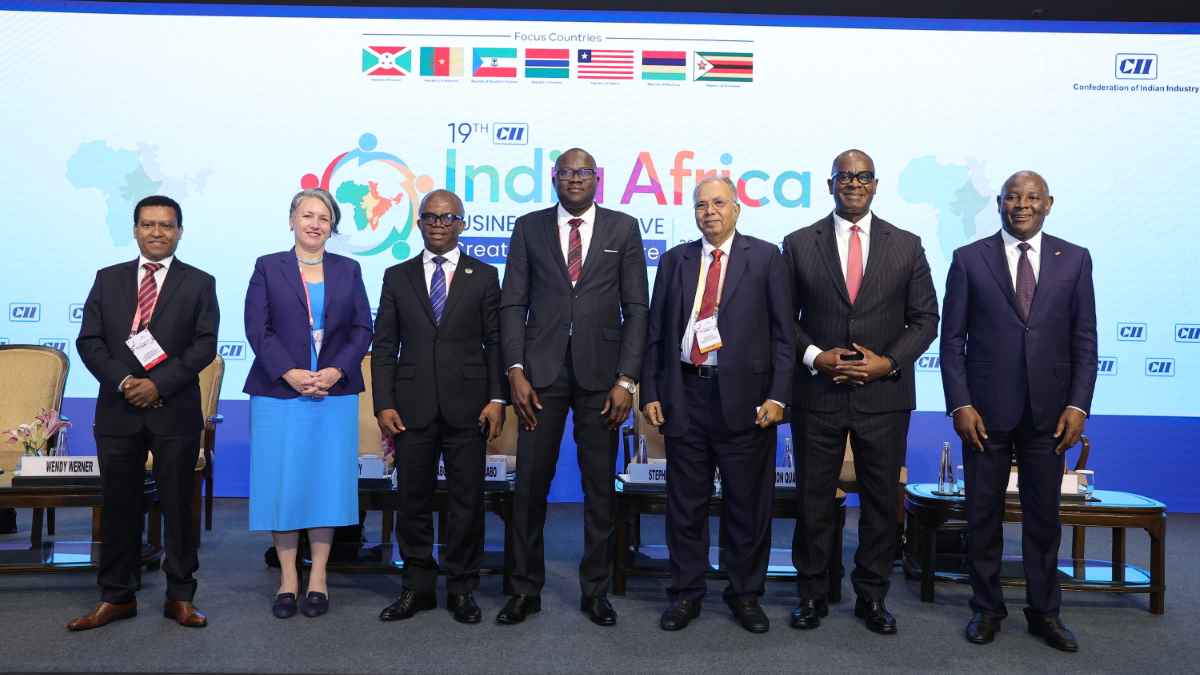The delegation participated in a roundtable with 15 Indian pharmaceutical and healthcare infrastructure companies, co-hosted by the Bank and India Exim Bank
ABIDJAN, Ivory Coast, September 17, 2024/APO Group/ —
An African Development Bank (www.AfDB.org) delegation led by Vice President Solomon Quaynor has concluded a four-day official visit to India to explore investment and trade opportunities and partnerships between Africa and India in pharmaceuticals, agriculture, and technology.
During the mission, which took in the cities of New Delhi, Gurgaon and Faridabad, Quaynor, the Bank’s Vice President for Private Sector, Infrastructure, and Industrialisation positioned the Bank as a potential partner to India’s private sector in the areas of project financing and de-risking initiatives, among others. He also promoted the Africa Investment Forum as a platform offering access to unparalleled investments across the continent.
The delegation participated in a roundtable with 15 Indian pharmaceutical and healthcare infrastructure companies, co-hosted by the Bank and India Exim Bank. Discussions centred on the opportunities and challenges presented by developing local production and robust infrastructure in Africa’s pharmaceutical markets, which face an estimated $111 billion investment gap through 2030.
The African Development Bank has developed a pharmaceutical and vaccine manufacturing strategy (https://apo-opa.co/47xpdte) and plans to invest up to $3.1 billion through 2030 to support its implementation.
Quaynor said, “We have partnered with the India Exim Bank to support Indian private sector participation in Africa’s growth story. This includes India’s private sector participating in government projects that the African Development Bank finances with India Exim export credit financing. An example is the Noor Ouarzazate solar power plant in Morocco, which was funded by an AfDB loan to the Moroccan government; the EPC involved two Indian companies Sterling & Wilson and Shapoorji Pallonji.”
During a meeting with Ms. Manisha Sinha, Additional Secretary of the Indian Ministry of Finance and the Bank’s Group’s Alternate Governor, Vice President Quaynor commended India’s long-standing support to the Bank Group, and highlighted potential areas of collaboration in youth training, digital financial inclusion, and the digitisation of health infrastructure.
We have partnered with the India Exim Bank to support Indian private sector participation in Africa’s growth story
Quaynor also participated in the 19th India-Africa Business Conclave, an annual event organized by the Confederation of Indian Industry (CII), in partnership with Indian Ministries of Commerce and Industry, and External Affairs. The Vice President stressed that Africa remains the second-fastest growing region globally, with average real GDP growth expected to reach 4.3 percent in 2025, up from 3.7 percent in 2024. According to African Development Bank forecasts, seventeen African economies are projected to grow by more than 5 percent in 2024.
During a panel session on critical minerals, Quaynor emphasised that African countries are seeking partners that can help them move up EV and battery supply chains, as Africa pursues industrialisation. He added that the African Development Bank helps finance projects by offering long-term debt and guarantees, as well as indirect equity through private equity and venture capital fund investments.
The Bank’s team also visited the premises of the Indian Agricultural Research Institute (IARI) to discuss potential collaboration on extension models, public seed systems, and training. The IARI played a key role in driving India’s green revolution, during which the country’s agriculture underwent transformation into a modern industrial system through adoption of high yielding variety seeds, mechanisation, irrigation and other inputs.
India recently contributed $6 million towards a new trust fund to be managed by the Bank, under a bilateral Technical Cooperation Agreement signed in March 2024. The Indian government has also provided $2 million to the Africa Digital Financial Inclusion Facility (ADFI) (www.ADFI.org), managed by the African Development Bank.
“As we look forward, there are key sectors of growth that Indian companies could have a competitive advantage over other global markets, thereby facilitating south-south cooperation,” Quaynor said. “This requires industrialisation in Africa – so moving up the production value chain in Africa to take advantage of the AfCFTA, which is a single continental market of 1.4 billion people and a GDP of over $3.4 trillion.”
The Vice president was joined by Mr. Osamu Kawanishi, Director of the Asia External Representation Office, Ms. Yuna Choi, Chief External Relations and Communications Officer and Mr. O’Neil Rane, Principal Resource Mobilisation and Partnerships Officer. The mission took place from August 20-23.
Distributed by APO Group on behalf of African Development Bank Group (AfDB).
